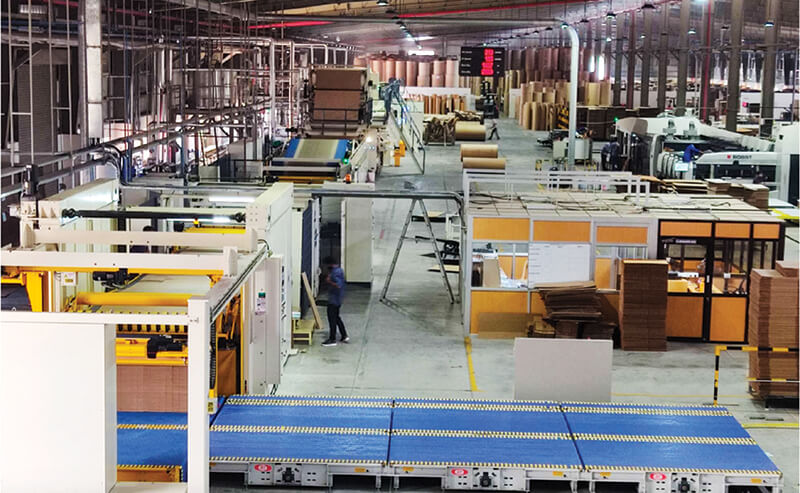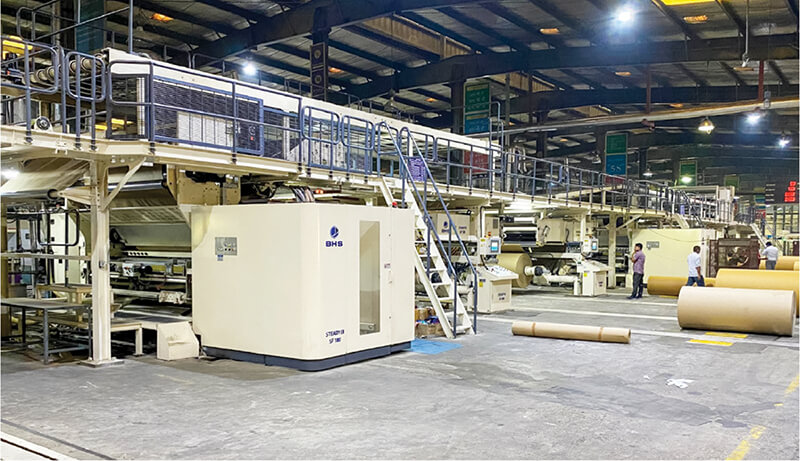We have corrugated box manufacturing plants at nine different locations with the paper converting capacity of 2,40,000 TPA.

Blending the art and science of packaging innovatively, Horizon Packs Pvt. Ltd. endeavours to create packaging that stands out as an example of excellence. From paper to boxes, the company’s expertise encompasses the entire gamut of corrugated packaging. With the vision of having a presence Pan-India with advanced infrastructure for maintaining sustainable growth, Horizon Packs aims to deliver operational excellence and non-compromising quality by providing optimal packaging solutions. Paper Mart got the opportunity to interact with Mr. Kirit Modi, Chairman & Managing Director, Horizon Packs Pvt. Ltd. and President Emeritus of Indian Corrugated Case Manufacturers Association (ICCMA) and know about his company and its state-of-the-art machines, his views on the current market situation after the pandemic and key expectations from the paper mills.
Paper Mart: Tell us about your company and manufacturing capabilities — monthly paper converting capacity and the key technologies you have in-house.
Kirit Modi: Horizon Packs Pvt. Ltd. has corrugated box manufacturing plants at nine different locations with a paper converting capacity of 2,40,000 TPA. All of our plants have automated corrugated lines with in-house state-of-the-art converting machines. We have been servicing a vast marquee clientele on a Pan-India basis for the past three decades. We cater right from the fast-moving goods category to white goods (electronics, household appliances) to foods & beverages. We cover most of the multinationals having a presence in the Indian market.
PM: What challenges do you face with regard to the quality of paper & paperboard? Please share some of your key expectations from the paper mills.
KM: Although most of the kraft paper mills have certainly improved their quality over the last few years, however, there are still a few issues that should be addressed by the mills. These issues are – odour in the paper, poor rewinding quality, and so on.
Our key expectations from the paper mills include:
- An uninterrupted and seamless supply of smell-free paper.
- Excellent rewinding can impact better runnability on high-speed lines.
- Commitment to provide committed linear meterage which must be mentioned on the paper reels.
- Standardisation of paper GSM and other parameters.
Our key expectations from the paper mills include an uninterrupted and seamless supply of smell-free paper, excellent rewinding that can impact better runnability on high-speed lines, commitment to provide committed linear meterage which must be mentioned on the paper reels and standardisation of paper GSM and other parameters.
Watch: Paper Mart News Roundup
PM: With the ‘New Normal’ imposed due to pandemic, what is the current market situation and what are your projections for the future?
KM: The advent of the pandemic and the start of a ‘New Normal’, as we call it, have brought with it a series of unprecedented changes in the way businesses, across a number of industries, function. With regard to the paper and paper-based packaging industry, there are four chief micro-level changes that can be categorised as — fundamental changes, structural changes, incremental/directional changes, and technology-led transformations.
Fundamental Changes
In particular, there has been significant volatility in the pricing of all commodities including major raw materials like – paper, coal, oil, starch, etc. This is significantly disrupting the overall production costs in the industry.
Also, owing to the ban on the import of waste paper and old corrugated containers in China from January 1 this year, the availability and pricing of kraft paper has been off the scale. Actually, Chinese paper mills turned to Indian paper mills to import large quantities of kraft paper, which impacted the availability of kraft paper for the Indian corrugated box makers. Moreover, the overall export opportunity of kraft paper for Indian kraft paper mills affected the domestic supply situation in the market.
With the onset of the pandemic, more and more consumers preferred online shopping which has boosted the growth in e-commerce. As a result, the demand for e-commerce packaging is also furthering and is likely to rise in the coming future.
All these factors in conjunction have impacted the demand and supply dynamics and their combined impact has affected the pricing and availability of the inputs for the paper and paper packaging industry.

Structural Changes
The emergence of integrated players is set to transform the packaging sector. Also, in the recent past, we have witnessed a number of large corporates entering the corrugated box industry. A number of FMCG brands, e-commerce majors, fashion companies, and many more across various industries are switching to sustainable packaging.
Furthermore, there has been a major consolidation wave – i.e. Mergers & Acquisitions, that’s been going on. This is likely to have a profound effect on the packaging industry’s growth prospects and long-term outlook.
Directional/Incremental Changes
In recent years, there has been a notable emphasis in product design to use lesser material to make lightweight packaging materials. The light-weighting package material is a long-term gain both from an economic and environmental perspective and it is going to be a key trend in the future.
In the paperboard packaging industry, the demand for finer flute grades is well-positioned for an increase in market growth owing to its potential for revolutionising both corrugated containers and folding cartons.
There have been a heightened focus on the environmental, social, and governance (ESG) measures. Traditionally, packaging converters have played the role of the compliant supplier to their larger and more powerful brand-owning customers. However, in the current scheme of things, manufacturers are emphasizing recycling, research, and the implementation of innovative methods that can make a difference in the long run. This can be accomplished by adopting the practices of a circular economy and integrating processes that address waste prevention.
With regard to the paper and paper-based packaging industry, there are four chief micro-level changes which can be categorised as – fundamental changes, structural changes, incremental/directional changes and technology-led transformations.
With the emergence and rise of new formats in retailing and the evolution of modern retail, modern-day consumers are increasingly looking for a shopping experience defined by value for money as well as sustainability. Here, the role of paper-based packaging comes into play. We are on the verge of a packaging renaissance in which new recyclable and compostable packaging materials are projected to permeate the market in the future.
Technology-led
It should be highlighted that with the emergence of the “new normal”, automation in the packaging industry, in particular, the application of high-end, sophisticated machinery has increased. The present pace of technological development is projecting profound changes. To support this growth, the packaging manufacturers are continuing to utilise improved technologies to provide added value to the end-users.
Additionally, the advancement in digital printing technologies and their immediate impact on the packaging industry marks another significant evolution in the paper-based packaging industry.
The use of functional coatings offers paperboard packaging improved water barrier, deep-freeze applications as well as excellent print receptivity. It can also enhance the aesthetics of the packaging. The demand is for high-performance and sustainable coating in paper and paperboards.
Also, the concept of ‘Green Energy’ is of crucial importance for the paper-based packaging industry. Since there are environmental concerns associated with power generation from non-renewable sources, it is high time that the use of renewable power, i.e. power from bio-based, renewable sources, increases in the paper mills and packaging units. It will enable the industry to be more energy-efficient and sustainable.
Also Read: Evolution of Paper-Based Packaging
PM: Please share your views on the market trends and the demand drivers.
KM: At present, the corrugated box industry has been facing a sea of challenges in various areas owing to factors such as massive paper price hikes and a rise in the cost of other inputs as well.

Recently, we have witnessed a great surge in the price of coal which is the main source of energy for paper mills. Subsequently, this has led to an evident increase in the overall production costs of paper mills. Thus, the energy crisis has had a huge impact on corrugated box manufacturers. Also, the price of imported waste paper has increased substantially for many reasons including almost a seven-fold increase in the global container freight charges. All things considered, it can be said that the huge upward price trends in a number of inputs and resources for the corrugated paper industry have dealt a massive blow. Unless box makers are given matching paper price hikes as well as an increase in conversion cost by the users/brand owners, the industry will face difficulties to survive.
As regards market trends and demand drivers, the corrugated box industry is well-poised and prepared to meet the increasing demand in tandem with India’s GDP growth. Major factors which will drive the demand going forward are:
- E-commerce
- Industries that will benefit from the PLI scheme announced recently by Govt. of India
- Food processing industry which will also benefit from Agricultural reforms announced by the Govt. of India
- FMCG and Consumer Durables Industry which will benefit from a rise in Discretionary Income of the Indian masses



